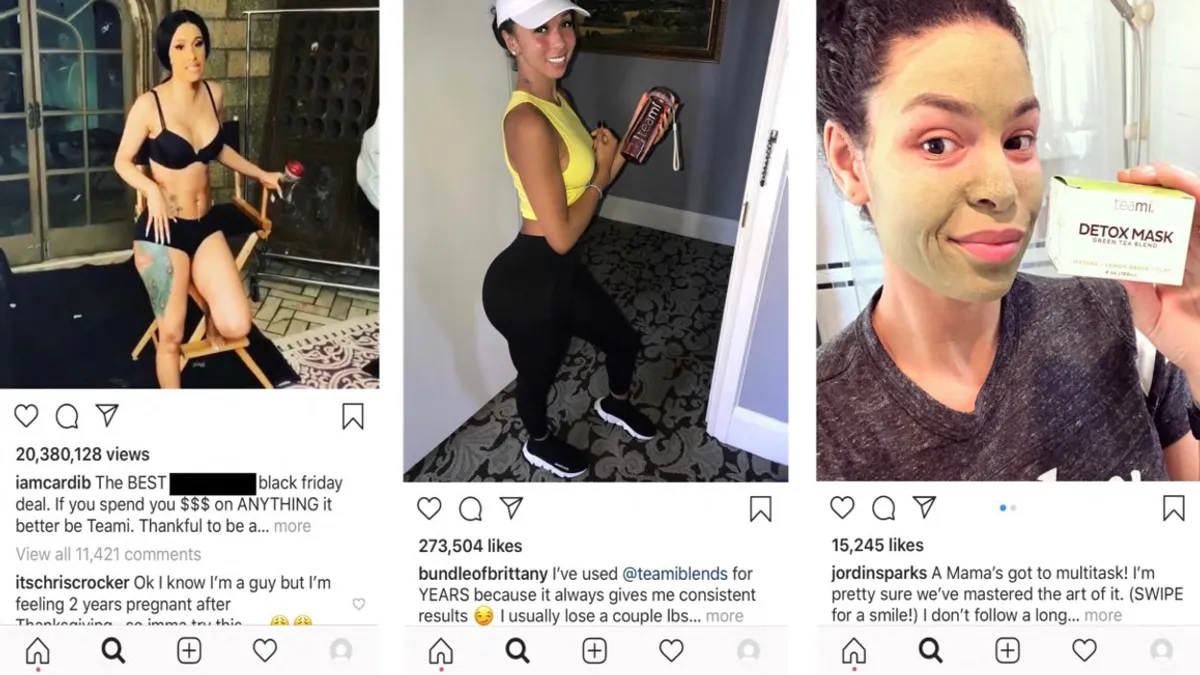Brief:
- The Federal Trade Commission (FTC) last week reached a settlement requiring a maker of detox teas to return $1 million to consumers and sent warning letters to influencers including rapper Cardi B for not disclosing paid endorsements, per an announcement. The FTC alleged that Teami and owners Adi Halevy and Yogev Malul made unsubstantiated health claims about the Teami 30 Day Detox Pack.
- The complaint highlighted promotional Instagram posts by Cardi B, Jordin Sparks and eight other influencers. Followers had to click on the "more" button in Instagram to see that the posts were paid endorsements, per the FTC.
- Teami was first warned by the FTC in 2018 that all disclosures on Instagram needed to be viewable without burying disclosures under the "more" button. The agency says Teami's deceptive influencer practices continued after FTC staff sent the warning years ago. The FTC imposed a $15.2 million judgment to reflect the total sales of the product, but suspended the amount based on Teami's inability to pay.
Insight:
The FTC's settlement with Teami highlights the agency's efforts to crack down on social influencer campaigns that don't comply with laws against misleading advertising. The judgment is notable for requiring influencer campaigns to clearly indicate when a sponsor is paying for the endorsement and to not bury that information under the "more" button on Instagram. As the FTC notes, it had warned Teami against that common practice two years ago. It's important for mobile marketers and social influencers to comply with the FTC's guidelines to avoid potential fines like Teami's and other penalties that can rock a brand's credibility among consumers.
This announcement comes a few weeks after the agency voted to seek public comment on whether to update its rules on the use of testimonials in advertising. The FTC has pursued enforcement against companies for disguising their advertising in influencer campaigns and online reviews, but is unsure whether those efforts are deterring misconduct, Commissioner Rohit Chopra said in a statement. The agency will consider whether there needs to be tougher penalties for companies that neglect to disclose paid endorsements or engage in illegal "astroturfing," the organized effort to influence opinion by mimicking a grassroots movement.
The FTC's concerns surrounding the potential abuses of influencer marketing has grown as more brands collaborate with social media celebrities on paid campaigns. Influencer marketing is considered effective at reaching younger consumers, with 44% of Gen Zers saying they had made a purchase decision based on an influencer's recommendation, compared with 26% of the general population, researcher Kantar found. Spending on influencer marketing is forecast to reach $15 billion by 2022 from $8 billion last year, Business Insider Intelligence estimated based on Mediakix data. Complying with the FTC's published guidelines is necessary for the influencer industry and marketers to avoid more serious crackdowns in the future.













